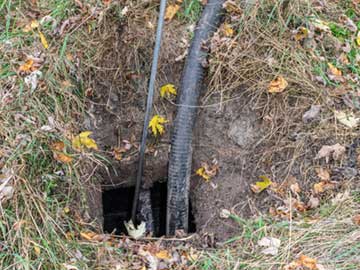
If you own a home, or perhaps just purchased a home with a septic tank – make sure to add regular inspections of that tank to your household maintenance checklist.
We recommend that if your household is 4 people or less, then have your septic tank inspected every 4 years. If your household is 5 people or more then you should have your tank inspected every 2 years. This schedule will ensure that you avoid any major sewage backups or other common septic tank problems.
How Often Should You Pump Your Septic Tank?
When it comes to actually pumping out your septic tank, the schedule should be every 3 to 5 years. Again, it depends on how much it’s used which of course depends on the number of people in the household.
Keeping to this schedule is extremely important to help increase the lifespan of your tank and also to help you avoid the damage and cost that can occur if there is a sewage backup in your home. After all, who wants to see (and cleanup) raw sewage from their showers, bathtubs and sinks?
What Are The Signs That Your Septic Tank Is Full?
There are 5 signs to look out for that indicate that your septic tank is full.
- sewage backup
- patches of very green grass in your yard
- slow drains and slow flushing toilets
- sewer odors
- signs of standing water
Sewage Backups
It’s very easy to identify when a sewage backup occurs. You will see (and smell) black water in your bathtub, sinks, toilets and/or showers. There’s no denying what it is and it’s a very clear (and usually the most common) sign that your septic tank is full.
If you have a multi level home you may notice this happening first in the drains in the basement or the first floor.
When this happens, immediately call a plumber to get your septic tank inspected and emptied.
Patches Of Very Green Grass In Your Yard
You may think that it’s perfectly normal for the grasssy area over your septic tank to be greener and look healthier than the rest of the lawn. But it’s actually not true.
So, if you notice that particular area of your lawn looking very lush, call to get a septic tank inspection right away. It could very well be a sign that your tank is filled to capacity.
Slow Drains and Slow Flushing Toilets
Another telltale sign of a filled septic tank is that your drains are emptying very slowly. Of course, this could also just be a clog somewhere in the sewer line.
Generally, sewer lines should be cleaned out every 18 – 22 months.
Toilets that flush slowly can also indicate either a filled septic tank or a sewer line clog.
If you have been maintaining your septic tank and you suspect the issue is a clogged sewer line you can read another article we wrote on How To Fix Sewer Drain Clogs or you can call in a professional plumber.
Sewer Odors
Your nose may tell you that your septic tank has reached it’s limit. The odor isn’t completely sewage because the septic system in your home doesn’t just collect human waste, it also collects water from your shower, washing machine and dishwasher. But the odor is very strong and unless you have lost complete sense of smell, you will be able to detect it when you step outside in your yard.
Standing Water
If you notice any standing water on your property in the area of the septic tank – that’s another telltale sign that something has gone awry and it’s strongly recommended that you call in a plumber to get the septic system inspected and probably emptied.
How Much Does It Cost To Have Septic Tank Inspected?
Costs run anywhere from $200 to $600 depending on the labor and time involved. A septic tank inspection could include any of the following:
- Locating the septic tank
- Excavation
- Measuring sludge and scum layers
- Visual inspection
- System tests
- Pumping
How Long Can A Septic Tank Last?
The age of a septic tank depends on the material that it is constructed out of.
- Steel tanks last 20 – 30 years
- Plastic tanks last 30 – 40 years
- Concrete tanks last 40 years or more
If you have any questions about septic tanks, call Atlantis Plumbing today at 770-505-8570. We are available 24 hours a day, 7 days a week.